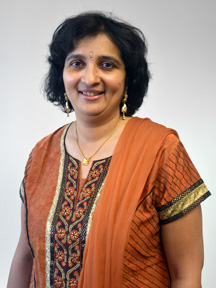 WESTON, MA—The performance of the 32-member Gandharva Choir in Boston last weekend was transcendent, and a real treat for New England’s classical and folk music lovers and even for those who are intrigued or intimidated by ragas and intricacies of Indian classical music.
WESTON, MA—The performance of the 32-member Gandharva Choir in Boston last weekend was transcendent, and a real treat for New England’s classical and folk music lovers and even for those who are intrigued or intimidated by ragas and intricacies of Indian classical music.
Most people have generally been exposed to Indian classical music through duet or solo singers, but last weekend’s performance was probably the first time for many to listen to classical music from a group of 32 singers in a formal setting.
“The immense coordination of the various singers with harmonic and rhythmic transitions while maintaining unison of tone and fidelity of sur demonstrated the extensive training by Pt. Madhup Mudgalji and the intensive practice these artistes have put in,” said Meena Sundaram, a cardiac specialist and a singer of Bollywood songs herself. “Truly [it was] a performance of the highest caliber and a treat for the music-lovers of New England.”
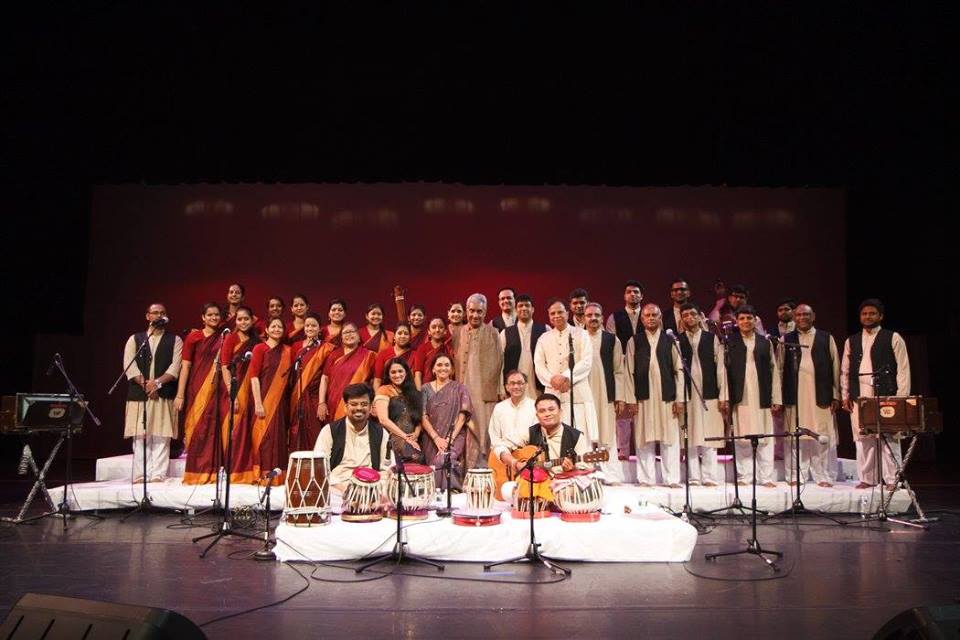
The Gandharva Choir was conducted by Pandit Madhup Mudgal, Principal of the Gandharva Mahavidyalaya in New Delhi. Mudgal has received many awards and recognition for his work, including the Padmashri (one of the highest civilian awards in India) in 2006. He has performed all over the world as a solo vocalist and with the Gandharva Choir.
Gandharva Choir is the premiere music choir of India. It was founded over 50 years ago, under the leadership of Pt. Vinaya Chandra Maudgalya, the founder and principal of Gandharva Mahavidyalaya. The Gandharva Choir has performed classical, folk and experimental styles of music extensively all over the world. The choir has performed around the globe including at Lincoln Center in New York and at Kennedy Center in DC.
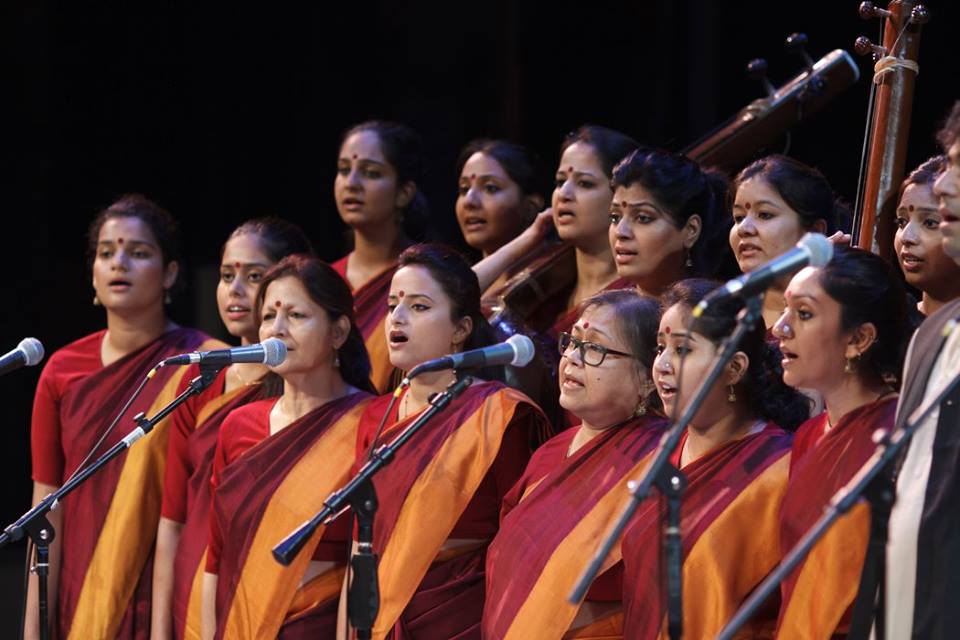
The Boston program was organized by the Meru Education Foundation and LearnQuest Academy of Music. Shekhar Shastri, director of the Meru Education Foundation, served as emcee, flawlessly narrating and explaining each item that was presented during the program.
“They were not known to the Boston audiences, and then comes this overwhelming response of the music aficionados to the stellar Gandharva Choir,” Shastri told INDIA New England News. “They kept asking for more from the singers, which means that the choir will have to come back to regale a larger informed audience.”
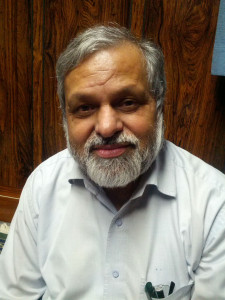
Pradeep Shukla, President of LearnQuest Academy of Music and a music teacher and singer himself, said the Gandharva Choir enchanted the Boston audience with a wide array of Indian classical music based genres in the choir form – from Dhrupad to Khayal to Carnatic Kriti to Qawwali to folk songs from various parts of India.
“Though there have been attempts at raga-based choir songs in the Boston area by groups consisting of more than 20 music enthusiasts and students, who presented these songs as invocations at the IAGB Independence Day event, local temples and LearnQuest Music Conference, this was perhaps the first time we witnessed a professional choir consisting of well-trained singers and accompanists, and conducted by a renowned classical musician and composer Pt. Madhup Mudgal,” Shukla told INDIA New England News. “It was not surprising that their superb performance, rich in melodic and aesthetic beauty, left the audience asking for more. It was indeed an inspiring and elevating experience.”
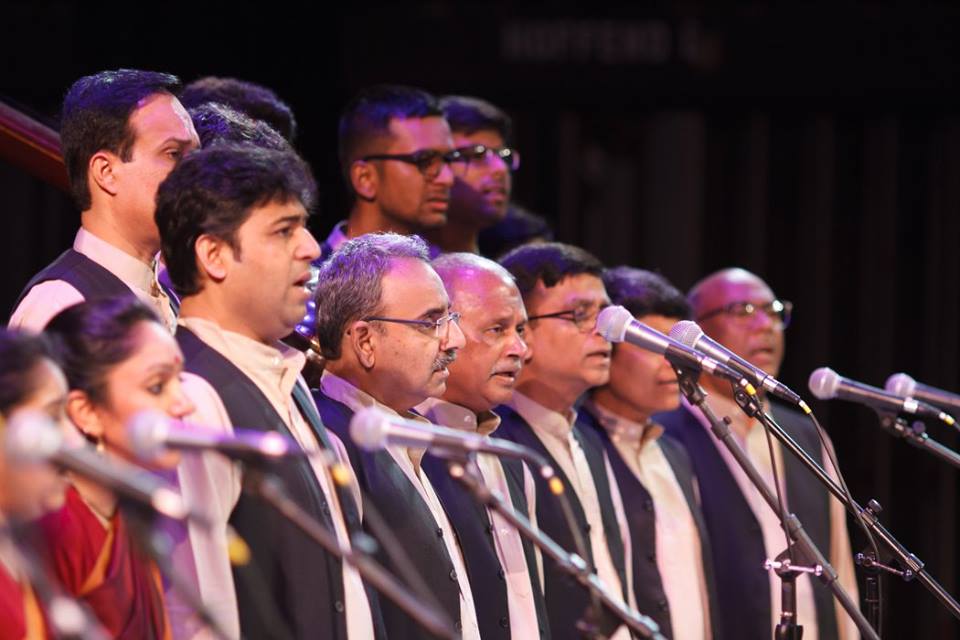
The program began with Svasti Vaachan, a hymn from the ancient Rigveda, to open the channel for a cosmic dialogue, and was followed by the following items:
- Dhrupad – Raga Kalyan ~ A composition in the ‘Dhrupad’ style of Hindustani classical music, set to ‘Chaar Taal’, a time cycle of 12 beats. In praise of Devi Saraswati, the Source of the Arts and all learning. Composed by Pandit Vinaya Chandra Maudgalya.
- Pancham ~ An experimental composition in Raga Kafi set to Taal Keherwa. Composed by Pandit Madhup Mudgal. The special feature of this song is that every sequence of the song ends on the note ‘pancham’. Listen carefully, to the 5th middle note Pancham that becomes the landing – in exploration of our own center.
- Dhamar – Raga Khamaj ~ The song describes the colourful festival of Holi celebrated in the Spring season. This composition is set in Raga Khamaj and Taal Dhamar (time cycle of 14 beats). Composed by Pandit Vinaya Chandra Maudgalya. Listen to the intricate rhythmic patterns.
- Aayal Ho Rituraj ~ celebrates the advent of Spring with all its splendor of beauty and color. It is based on classical and folk melodies of Malwa region of India. Composed and taught to the Gandharva Choir by Pandit Kumar Gandharva.
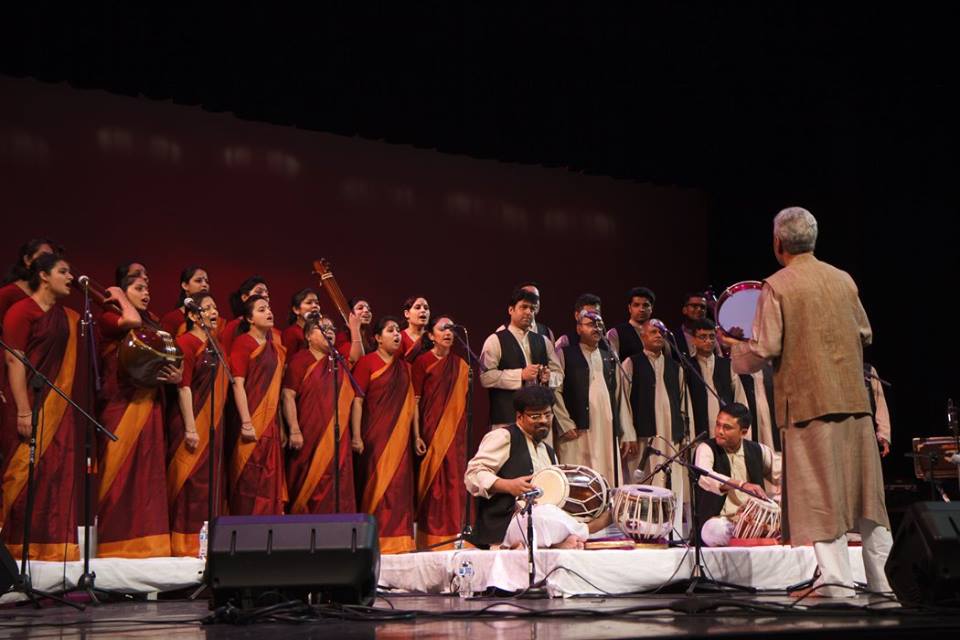
(Photo credit: Duan Wang) - Jaya Jayakara Karaa ~ A Marathi song written by poet Govindagraj and composed by P.L. Deshpande in praise of ‘vaagdevi’ Saraswati. This is a raga-malika where every stanza of the song is set in a different raga. The ragas used are: Kedar, Vasant, Deshkar, and Bheempalasi.
- Bhenge Mor ~ A Bangla devotional song written and composed by Noble Laureate Poet Guru Rabindra Nath Tagore. In this song the devotee is praying for release from human bondage and for enlightenment. ‘Bhenge Mor’ set to Dadra Taal (time cycle of six beats).
- Haman Hai ~ A nirgun bhajan of Saint Kabir Das, composed by Pt. Madhup Mudgal.
- Aabhas ~ An abstract composition ‘Aabhas’ , which consisting of sargam and rhythmic patterns – composed by Pandit Madhup Mudgal.
- Telisi Ram ~ A popular kriti or a classical devotional composition in Carnatic style composed by Tyagaraja Swami in Raga Poorna Chandrika set to Aditaal.
- Aj Nij Ghat Bich ~ A Malwa devotional composition in Raga Kafi written by Saint Dharamdas.
- Charishnu ~ An experimental piece composed by Pandit Madhup Mudgal in Raga Jog, ‘Charishnu’ literally means ‘never-ending’. Thousands of dancers all over the world have performed to this composition.
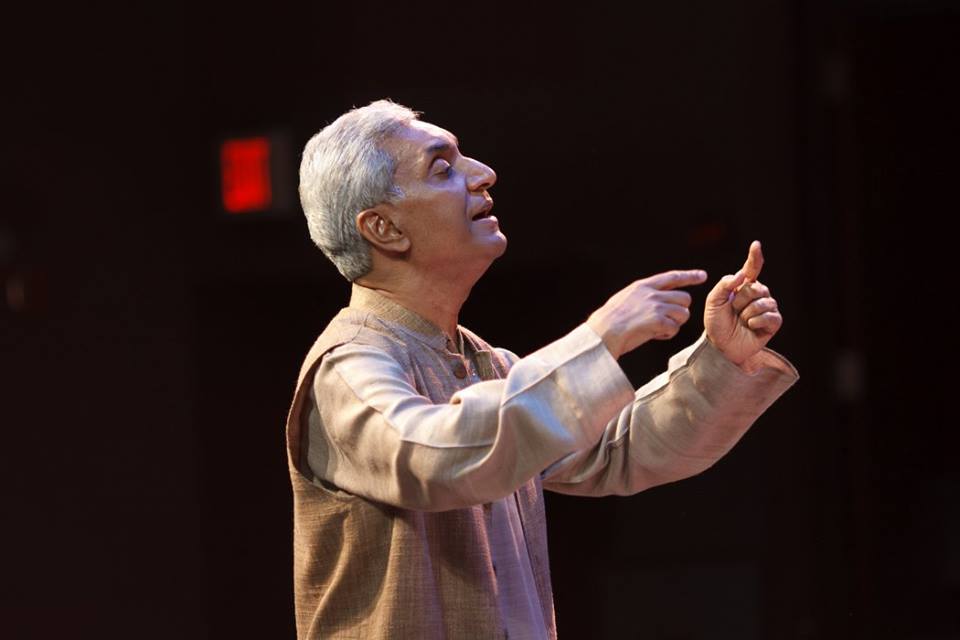
(Photo credit: Duan Wang) - Agnisukta ~ Appropriately placed at the very beginning of Rigveda, this hymn invokes Agni, the fire God. Composed by Pandit Madhup Mudgal, the piece is based on the harmonics of ‘madhyam tanpura’.
- Beero Aayo Levan ~ A Rajasthani folk song in which a bride tries to persuade her reluctant husband to allow her to go to her father’s house. Her brother has come to fetch her and she is anxious to visit her folks.
- Rut Albeli ~ An echo song describing the picturesque the season of Spring. Vasant stirs up emotion of love as the soft fragrant breeze gently sways the flower laden branches on which birds chirp merrily. Composed in Raga Pahadi by Pandit Vinaya Chandra Maudgalya.
- Bharati Jaya Vijaya ~ A patriotic song written by poet Suryakant Tripathi Nirala composed in Raga Malkauns, set to Drut Ektaal. The song describes the beauty of the motherland – her shores are washed by the ocean, she is crowned by the gigantic Himalayas, and she is surrounded with the eternal sound of ‘OM’. Musical composition by Pandit Vinaya Chandra Maudgalya.
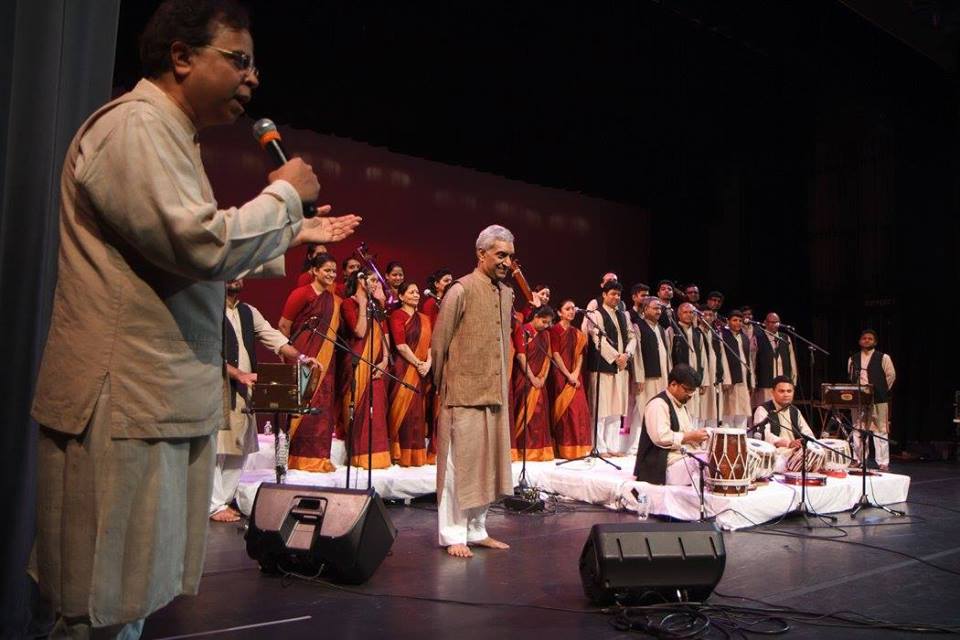
(Photo credit: Duan Wang) - Akka Kedawa ~ Composed by Pandit Mallikarjun Mansoor, this is one of the most popularly sung Vachans of Akka Mahadevi, a well-known saint of Karnataka.
- Saanware Sonanu ~ A Gujarati folk song about the dialogue between a husband and wife, where the wife teasingly reiterates her superior position.
- Saiyan Kode Khetva ~ A Bhojpuri folk song from Bihar, this is in the form of a dialogue between the men and women peasants as they work in the fields. The women offer to help the men in their hard work while the men promise them gold bangles and fine saris in return.
- Qawwali ~ Composed by Hazrat Amir Khusrau in the 13th century, this Qawwali is set in Raga Bhairavi. The first half of the verse is in ‘Persian’, while the second half is in ‘Awadhi’.
- Jaya Bolo Siyawar Ram Ki ~ A robust folk song from Uttar Pradesh based on Ramayana, the Hindu epic. The glory of the noble king Rama is sung, that depicts the victory of good over evil.
- Hau Saiba ~ A Konkani folk song from Goa. Choral arrangement by Pandit Madhup Mudgal.
- Vekho Ban Than Aai Vasaakhi~ A Punjabi folk song describing the lively atmosphere of Baisaakhi – the festival of harvest and Punjabi New Year. It moves in the rhythm of Keherawa Taal.
This additional item was performed on popular demand:
- Bahurahava Bhangia: A Bhojpuri folk song.















